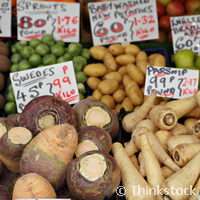Improving the health of Europe's fruit and veg industry

Fruit and vegetables are not just good for your health; they also form the basis of a strong and sustainable European economic sector. Some 10 000 businesses - about 90 % of which are SMEs - are involved in fruit and vegetable processing, employing around 280 000 employees. In order to remain competitive in the face of foreign competition however, investment in new technology capable of improving quality and reducing waste is vital.
This is the goal of the EU-funded RESFOOD project, which began in November 2012 with some EUR 4.3 million in EU funding. Currently at the halfway stage, the project has successfully demonstrated how the sector can cut water consumption by over 40 %, while still maintaining the same fruit quality and yield in soilless cultivation. This particular innovation is now set to be tested during the next harvest season by Spanish researchers and blackberry producers.
This is one example of the kind of innovation that RESFOOD hopes to implement in order to make the European fruit and veg sector more sustainable. Due for completion in October 2015, the project will also encourage the involvement of SMEs as end users of green technologies. For this reason, SMEs have been closely involved throughout the project in the development of new innovations. In the area of the water treatment for example, project partners have cooperated with end-users in order to implement new treatment technologies.
RESFOOD will also help industry respond to rising challenges such as tightening regulations on emissions, water scarcity due to climate change, increasing prices of fresh water and safety concerns related with fresh cut products. Other SMEs have been involved in developing new monitoring tools and methods of waste disposal, while fruit and vegetable producers and suppliers have been at hand to test new technologies. The focus now is on intensifying efforts to demonstrate that the results achieved in pilot tests can be replicated in real industry and market situations.
Achieving resource efficiency in food production is not just a question of economics - the RESFOOD project also aims to bring about long term environmental benefits. Many natural resources - minerals, water, soil, biomass, land and fuels are used to grow and process food products, but in many cases their usage is highly inefficient, leading to unnecessary waste and pollution. Indeed, one important challenge in the food chain management is dealing with the large amount of wasted food. In 2013, the British Institution of Mechanical Engineers (IME) estimated that half of all food worldwide is wasted.
RESFOOD therefore brings all these strands together - environmental, regulatory and economic - in order to bring about beneficial change along the whole supply chain. Developing innovative technologies for the re-use of nutrients, energy, water and biomass will save industry money, improve efficiency and reduce environmental damage. Furthermore, new methods for improving disinfection processes for vegetables and better monitoring will make Europe's food supply even safer.
Indeed, the project partners are confident that water, energy and nutrient use in fruit and veg processing can be cut by between 30 and 75 % and the use of fertilizers by between 20 and 30 %, which will help ensure that Europe continues to embrace sustainable practices.
Provided by CORDIS




















